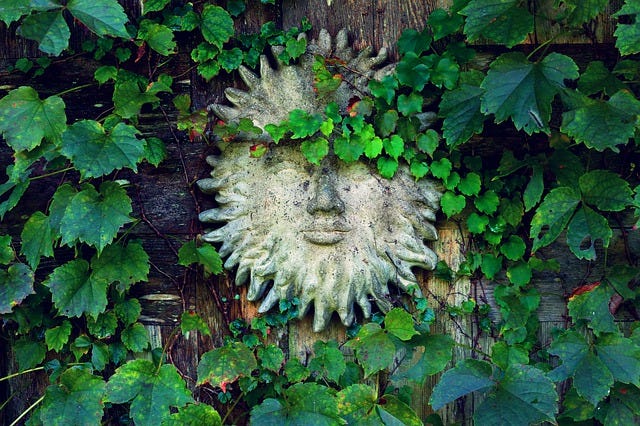Creating the Webbd Wheel: Reclaiming Sacredness
In which we reawaken our capacity for veneration and awe ...
The word sacred means worthy of veneration or awe. It commonly suggests an association with the divine. It seems to me we are losing our feeling for sacredness, and have been for some time. I’m not talking about religion, per se, as many aspects of Christian religion, at least, appear to be moving away from sacred as well. Disempowerment, judgement, and encouraging people to turn against one another are not sacred.
I see the loss of sacredness as a terrible and dangerous tragedy. We humans appear to have unlimited hubris, and a genius for taking something fine and beautiful and fouling it. We do it to our bodies. We do it to the planet. We do it to the life around us. As we wreak havoc, we substitute the irreplaceable with money and toxic mimics for power. We manufacture, produce, buy, move faster and faster, get noisier and noisier, and become more and more unhealthy and unhappy.
I am not the only one who has noticed this trend over the last decades. Writers and scholars such as Clarissa Pinkola Estes and Dr. Sharon Blackie, to name only two, have also observed it and written about how we might find our way back into silence, reverence for nature, and presence within our lives.
The Webbd Wheel series is my response to the loss of sacredness, a reminder to myself and others to slow down, be still, and remember life itself is worthy of veneration and awe. The natural world around us, from the most microscopic animals to the oldest trees to the mammoth whales, is sacred. We ourselves, our miraculous, complex bodies; our instinct, feelings, and intuition; our sexuality and ability to create new life, are sacred.
Money is not sacred. Nor are little tin gods. Shiny toys are not sacred. These things and people are not worthy of veneration. They will not sustain us. They will not make us better humans.
I have always thought of sex as a sacred act. Sadly, I’ve never found a partner who viewed it so, which is not surprising given the terrible sexual repression and dysfunction staining our culture. Instead, we are taught to feel shame about our bodies and sexuality. We use labels like “slut,” “prick teaser,” and “whore.” We live in a misogynistic rape culture, which is not healthy for men or women. The beautiful act which results in new life has been distorted and fouled beyond recognition, and women are neither safe nor free in their rightful sexuality.
Yet I persist in believing the human body is a sacred thing, a vehicle allowing us to interact with our world in astonishing ways. Sacredness is simple: the brush of grass against our bare skin, the feel of living water against our flesh, the magnificent night sky, the warmth of the sun, birdsong, the eager blossoming of our bodies into sexual desire, aging, death.
Rapunzel realizes her beauty is not sacred. Her appearance is not essential to her identity. Her strength, her courage, her resilience – these are the characteristics defining her. Our bodies, our envelopes, if you will, are not less magnificent because we or someone else judges them unbeautiful. I will never forget a lover telling me my silvery pregnancy stretch marks were “not pretty.” Not pretty. Two strong, handsome, healthy boys born into the world, and all he could say about it was the stretch marks resulting from the sacred act of giving birth were not pretty.
In every page of these books I shine a light on what is sacred, if only we can remember to notice and appreciate the life around us and within us. The face of a friend, the laughter of a child, the affection of a pet, the bones Nephthys carries, Mary’s dawning sexuality, Lugh’s beckoning music, Rapunzel’s determination and courage, Baba Yaga’s guidance and teaching, all sacred. Not pretty, not easy, not comfortable, maybe, but sacred. Holy. Worthy of veneration and awe.
(This essay was published with post #35 of The Hanged Man.)



